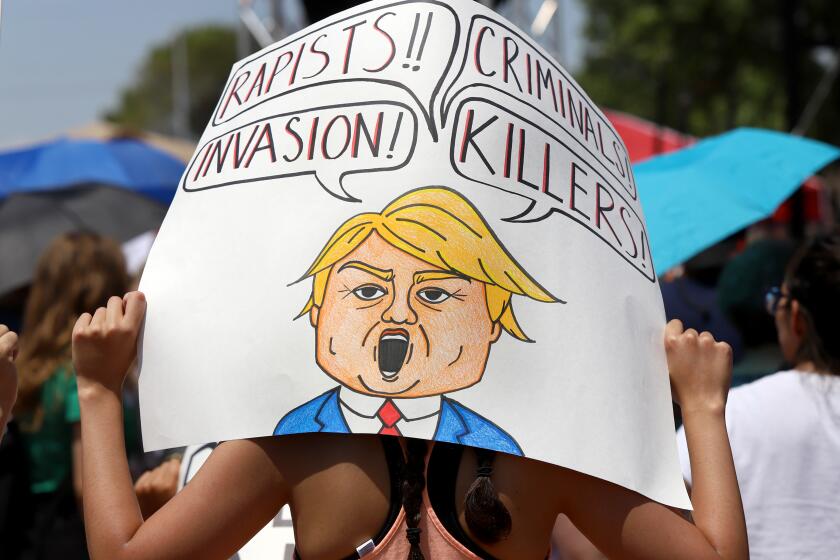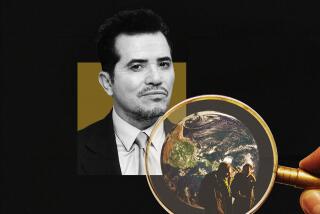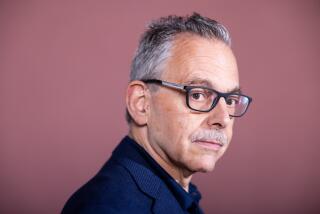Frank Cruz had a short fuse for second-class treatment. So he blazed a path for himself
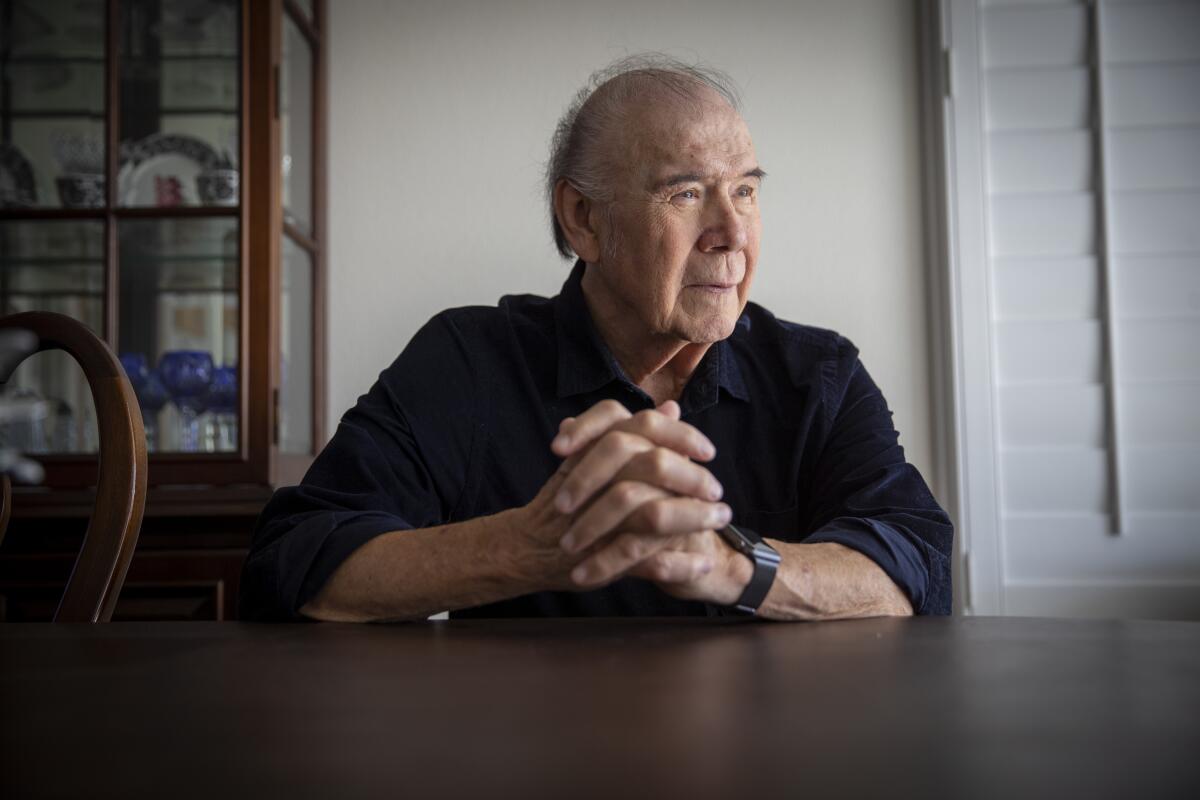
Frank Cruz always told other people’s stories. Now, he tells all in his memoir about his days as a reporter, Telemundo co-founder and everything in between. He carved paths for others along the way.
- Share via
Chicano history professor. TV news reporter. Anchor. Network executive. Public broadcasting leader. Co-founder of one of the nation’s first Latino-owned life insurance companies. And co-creator of the second-largest Spanish-language TV network in the country — Telemundo.
On a recent Friday afternoon inside his Laguna Niguel home, Frank Cruz, now 80, looked back at his extensive life — from his boyhood in Tucson’s Barrio Hollywood, to his post-Air Force days at East Los Angeles College, to the succession of achievements he details in his memoir “Straight Out of Barrio Hollywood: The Adventures of Telemundo Co-founder Frank H. Cruz,” co-authored by Rita Joiner Soza.
Over his long career, Cruz has infiltrated spaces where few Latinos had stepped foot before — namely, media spaces that ignored the diverse and growing Latino population in Los Angeles. But this wasn’t his plan as a boy back in Tucson. As he puts it, Cruz likes to say he got into journalism “totally by accident.”
The year was 1971. Cruz was chair and professor for Cal State Long Beach’s Chicano Studies department, when he received a call out of the blue from KABC-TV news director Bill Fyffe offering him a job.
“He asked me: ‘Are you interested in news?’ And I said, ‘Sir, I’m not a journalist. I’m a historian,’” Cruz recalled. But Fyffe, known for popularizing the Eyewitness News format, was persuasive. He told Cruz he wanted him to do “the very same thing you did on that Chicano series.” He was talking about “Chicano I & II,” a groundbreaking, 20-part series on Chicano heritage that Cruz and other Latino professors had created for KNBC-TV. Fyffe had taken a look at the growing Latino audience in Southern California and decided he needed a reporter from the community to cover the issues important to those viewers.
“It was tempting to me because Watergate was running rampant and you could do a lot with television in those days, and I kept saying to myself: ‘120 students a semester at Long Beach State; here’s a chance to reach thousands,’” Cruz said. He figured if it didn’t work out, he could go back to teaching.
At first, things went well at KABC. Cruz gave Fyffe what he asked for: stories on Latino issues. That focus, however, led some viewers to see his reporting as too narrow and some at KABC nicknamed him and a fellow Chicano colleague “Spic and Span.” In 1975, after three years at the station, Fyffe let Cruz go.
But he quickly found a new TV home. A chance encounter at a party with the powerful sports and entertainment agent Ed Hookstratten led to Cruz accepting representation with the agent and a new contract with KNBC-TV as a reporter.
In those days … Latino TV journalists were our celebrities.
— Felix Gutierrez, journalism professor
“Why me?” Cruz asked Hookstratten after the agent said he wanted to take on the fired reporter. Hookstratten told Cruz that two Latino men had played crucial roles in Hookstratten’s success, and he wanted to pay it forward. Cruz stayed at KNBC-TV for a decade and became an anchor at the station where, he said, “I began my education in the business of television production over the next 10 years.”
“In those days … Latino TV journalists were our celebrities,” said Felix Gutierrez, a journalism professor emeritus at USC who first met Cruz in 1969 in Lincoln Heights.
“This was before Eva Longoria or [other] TV stars. We didn’t have our people in movies, on TV shows, on sports and things like this,” Gutierrez added. “So the only ones you saw regularly that had any proper role were the people who were giving the news.”
For the next several decades, Cruz lived many lives at a time when few Latinos were publicly visible, turning his frustrations about the media’s lack of Latino representation into propane to transform it: “I’ve had a short fuse for second-class citizenship, for second-class treatment. I never liked that at all.”
President Trump calls Latinos “invaders.” Culture could offer a counter narrative—yet it does not.
In the mid-1980s, he applied his local news experience to co-founding KVEA, the city’s second Spanish-language TV station. That venture evolved into the founding of Telemundo in 1987.
“He was very energetic. Very community minded,” said Antonia Hernandez, CEO and president of California Community Foundation. She met Cruz in the mid-1970s when she was a young attorney and he a young reporter. “He was very committed to reporting what was happening in underserved communities, specifically the Latino community at that time.”
In 1994, President Bill Clinton appointed Cruz to the Corporation for Public Broadcasting, becoming the first person of color to hold that position.
“It has always been my drive to penetrate those entities and to be in a position of power so that you can influence those decisions,” Cruz said. He spent 12 years on the board and became its chairman, a position that enabled him to make a difference in programming decisions.
One morning while sipping coffee and reading the newspaper, Cruz ran across CBS’ fall lineup. “They picked up all these different dramas ... and they didn’t pick up ‘American Family,’” he recalled of the TV drama that followed the lives of a Latino family in L.A. “The pride in me said, ‘Call, and maybe we can get it.’”
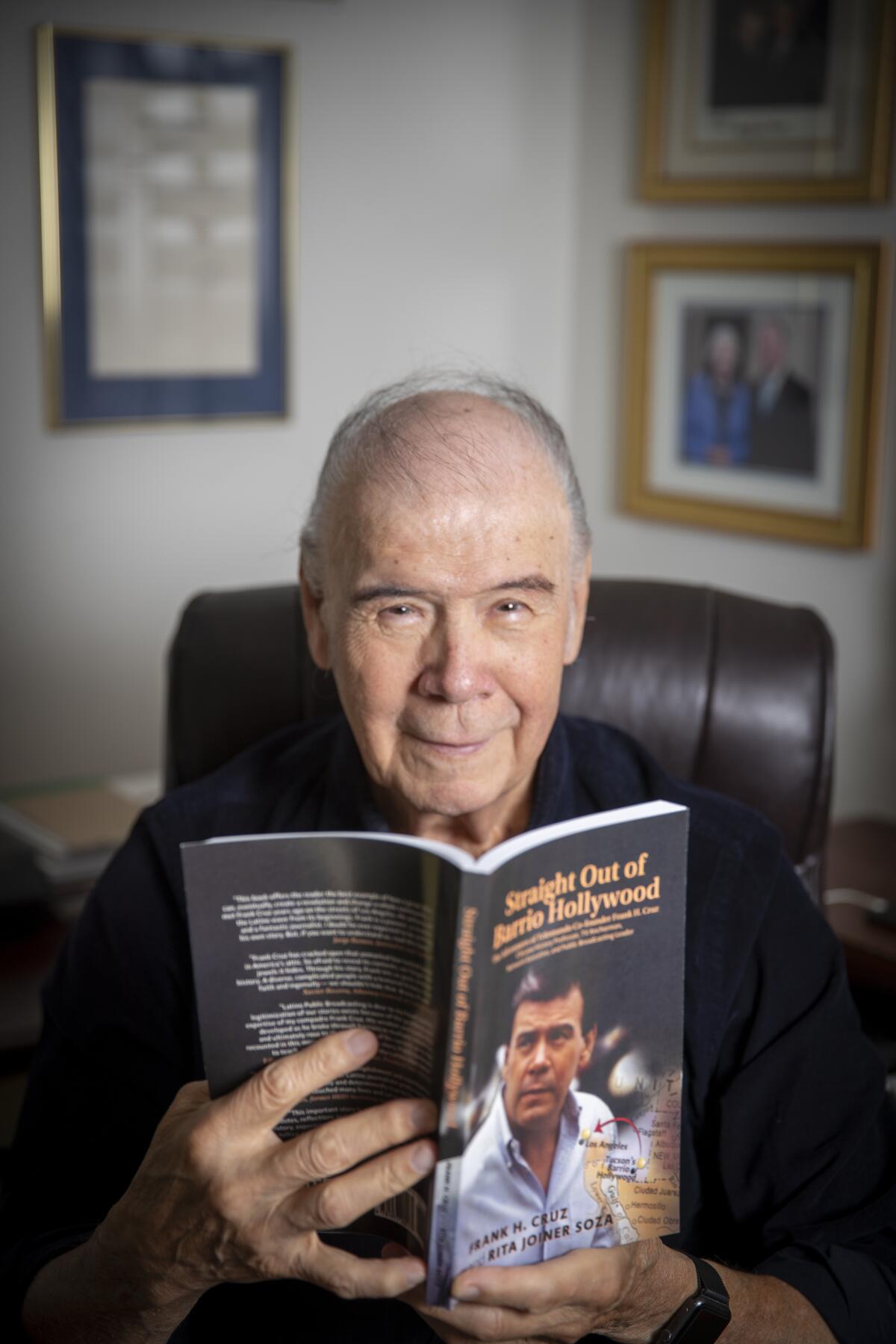
So he called CBS boss Les Moonves and asked if public broadcasting could have it.
“And he said, ‘Frank, go ahead. Have it. Just give us credit for the first show.’”
“American Family” aired in 2002 and was the first series to feature a majority Latino cast, including Edward James Olmos, Constance Marie, Esai Morales, Rachel Ticotin, Sonia Braga, Michael Peña and Kate Del Castillo.
Had a Chicano not been chair of CPB, it would’ve never dawned on another person to ask for the show, said Cruz.
“We’re not going to change society until we get Latinos in there, into those positions of leadership so that they can dictate that kind of change,” he added, his impassioned voice rising slightly.
It took Cruz decades to finally tell his story, and some nudging from friends and family. The memoir was recognized at the International Latino Book Awards from the nonprofit Latino Literacy Now.
“He has the ability to look ahead,” said Gutierrez, “to see what isn’t there that should be there and then finding a way to make it happen or help others make it happen.”
Cruz is aware of his legacies, in shedding light to Latino communities. Yet he doesn’t boast. He wears humility on his sleeve. And he thanks his roots for that.
He credits his accomplishments and hard-work ethic to “a very powerful role model” with an unmatched entrepreneurial spirit: his widowed mother, Rutila “Ruth” Osuna Peralta, who at 24 was raising solo two young boys and running a restaurant, Columbia Cafe. (Cruz’s father died of meningitis before he was born). He worked there for some years, a job that instilled in him a work ethic that developed his self-confidence, he said. The responsibilities nourished the self-esteem and self-assuredness that catapulted him into the highest ranks of his very distinct careers.
“I went through life and I was accomplishing things and doing things, but to brag about it was never one of my strong suits. I did not want to do that or like to do that,” he said matter-of-factly.
But telling his story, he realized, served a historic purpose. And if it could help influence and inspire young Latinos and Latinas to pursue their own dreams and curiosities, then all the more reason to tell it.
Looking back, there’s only one thing Cruz would’ve done differently. “One thing I’ve often thought of, because it had intrigued me, I probably could’ve gotten a law degree.”
For now, he’s busy enough as a board member for the James Irvine Foundation and as a trustee for his alma mater, USC, where he’s served for almost 20 years. “It has been a tough period for me,” he said, referring to the school’s recent scandals.
It’s not anything he can’t handle. His life and history are marked with countless hard fights and plenty more victories. He’s content for now doing what he does. Enjoying simple pleasures like gardening and cooking for his family.
And reflecting on his achievements while sharing what he’s learned: to initiate that invitation, or say “yes” to it.
“You’ll have a meeting with someone, you’ll have a luncheon with someone, you’ll go to a lecture, you’ll read a book … if you’re inquisitive and you have curiosity, you’ll say ‘Gee, I’d like to try that,’ or ‘Why not?’”
Heck, that’s how the seed for Telemundo spawned. Over a cup of coffee.
More to Read
The biggest entertainment stories
Get our big stories about Hollywood, film, television, music, arts, culture and more right in your inbox as soon as they publish.
You may occasionally receive promotional content from the Los Angeles Times.
